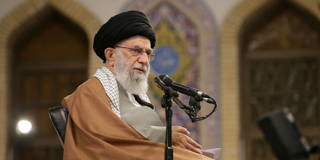One hopes that Iranian leaders' domestic woes and deep desire for self-preservation will lead them to embrace symbolic acts of retaliation in response to the recent assassination of the security and intelligence chief Qassem Suleimani. And one hopes that the US, too, will act prudently in responding to Iran’s next move.
STANFORD – The assassination by the United States of Qassem Suleimani, the commander of Iran’s Quds Force, was certainly a major escalation in the two countries’ long-running conflict. But it need not beget World War III (as some pundits are already predicting). Moreover, while the US may have achieved a short-term tactical advantage by killing Suleimani, the Iranian regime could yet benefit from recent developments.

STANFORD – The assassination by the United States of Qassem Suleimani, the commander of Iran’s Quds Force, was certainly a major escalation in the two countries’ long-running conflict. But it need not beget World War III (as some pundits are already predicting). Moreover, while the US may have achieved a short-term tactical advantage by killing Suleimani, the Iranian regime could yet benefit from recent developments.